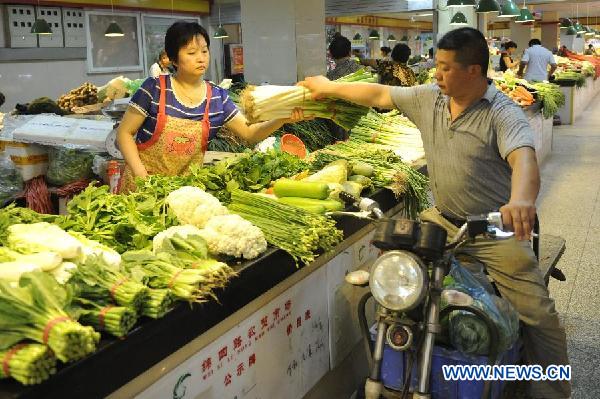 er price index, a main gauge of inflation, grew 2.3 percent year on year in June, down from 2.5 percent in May, China's National Bureau of Statistics (NBS) announced on Wednesday.
er price index, a main gauge of inflation, grew 2.3 percent year on year in June, down from 2.5 percent in May, China's National Bureau of Statistics (NBS) announced on Wednesday.The growth was in line with previous market forecasts that the CPI would further moderate in June from the previous month. NBS data also showed the inflation rate in the world's second-largest economy stood at 2.3 percent in the first half of 2014.
"The lower inflation rate last month was mainly because of lesser impact from the carryover effects from last year, and fewer new factors for price gains compared to May," said Yu Qiumei, a senior NBS statistician.
In June, inflation in the country's urban regions grew 2.4 percent, higher than the 2.1 percent in the rural regions, NBS data showed.
Food prices, which account for around one third of the weighting in the CPI calculation, grew at a tempered rate of 3.7 percent year on year last month, down from the 4.1-percent growth in May. Food prices in June also declined 0.4 percent month on month.
In the food category, fresh fruits provided the greatest boost to inflation, with prices jumping 19.8 percent year on year in June, contributing 0.42 percentage points to the CPI.
The meat and poultry category in general rose 1.9 percent, pushing up the CPI by 0.14 percentage points, but the price of pork, a staple of the Chinese diet, dipped 2.7 percent.
Prices of sea products grew 4 percent; prices of grain went up 3.2 percent, while fresh vegetable prices went down 1.8 percent, the NBS said.
Non-food prices, such as those for tobacco, liquor, transport, and telecommunications, remained flat compared to May.
NBS data released on Wednesday also showed China's producer price index, which measures inflation at the wholesale level, dropped 1.1 percent year on year in June. However, the decline narrowed by 0.3 percentage points compared to the previous month.
Analysts said price levels in China were generally in a low territory in the first half of this year amid an economic slowdown which reduced demand. They said the country is currently not faced with much pressure to control inflation, which would leave more room for the easing of monetary policies to boost growth.





